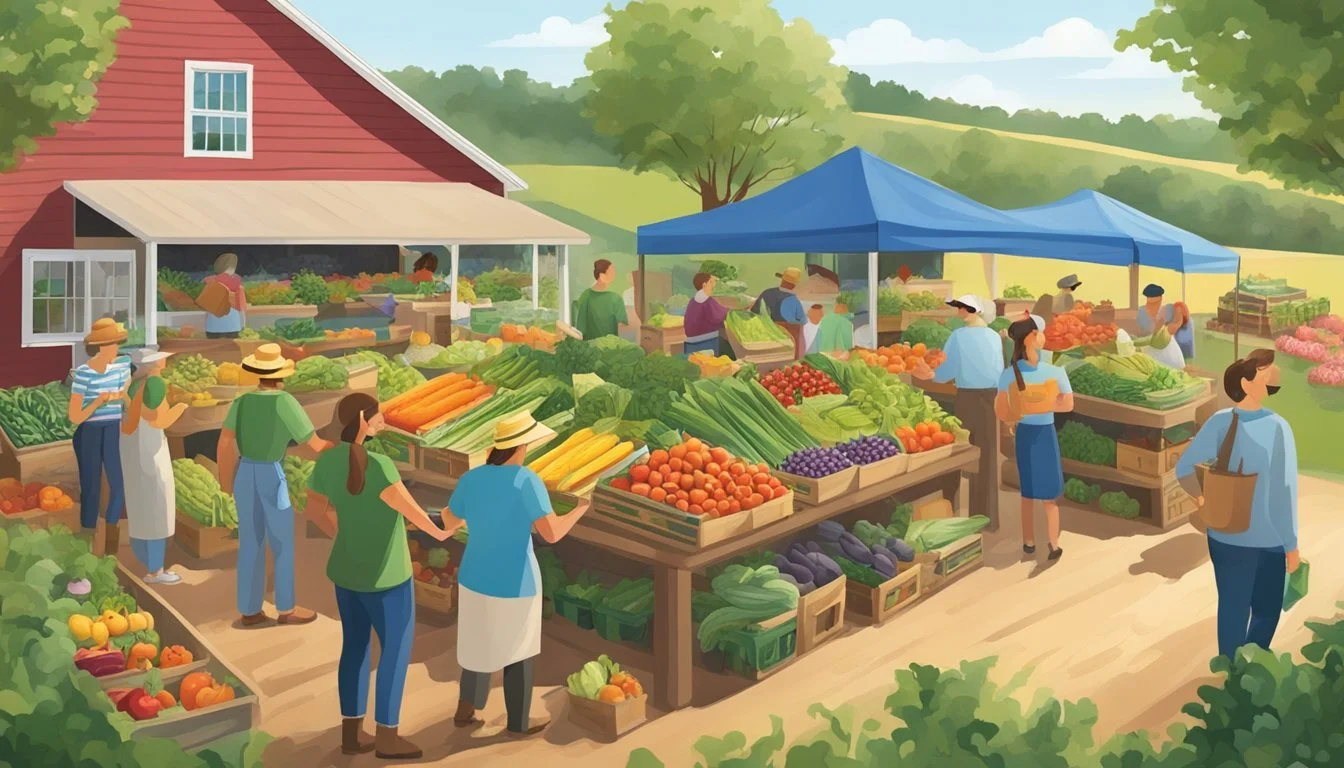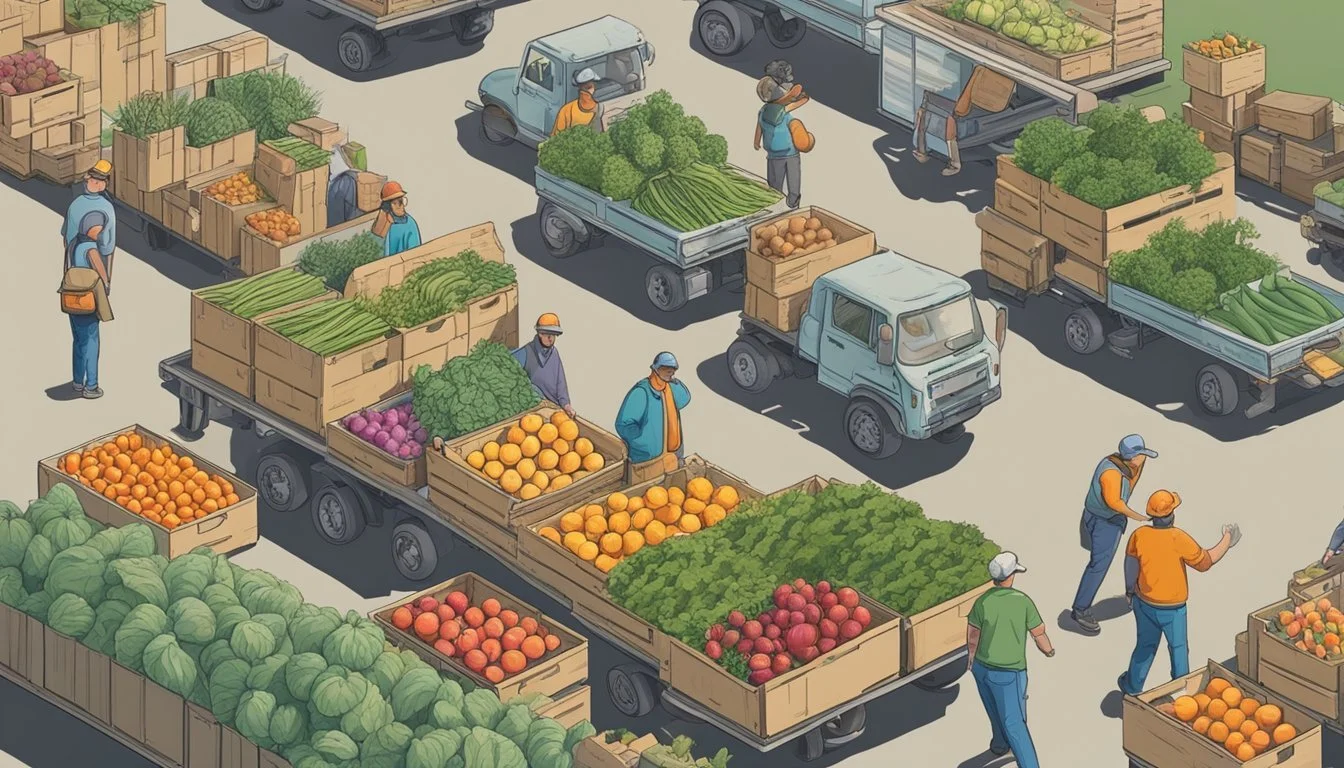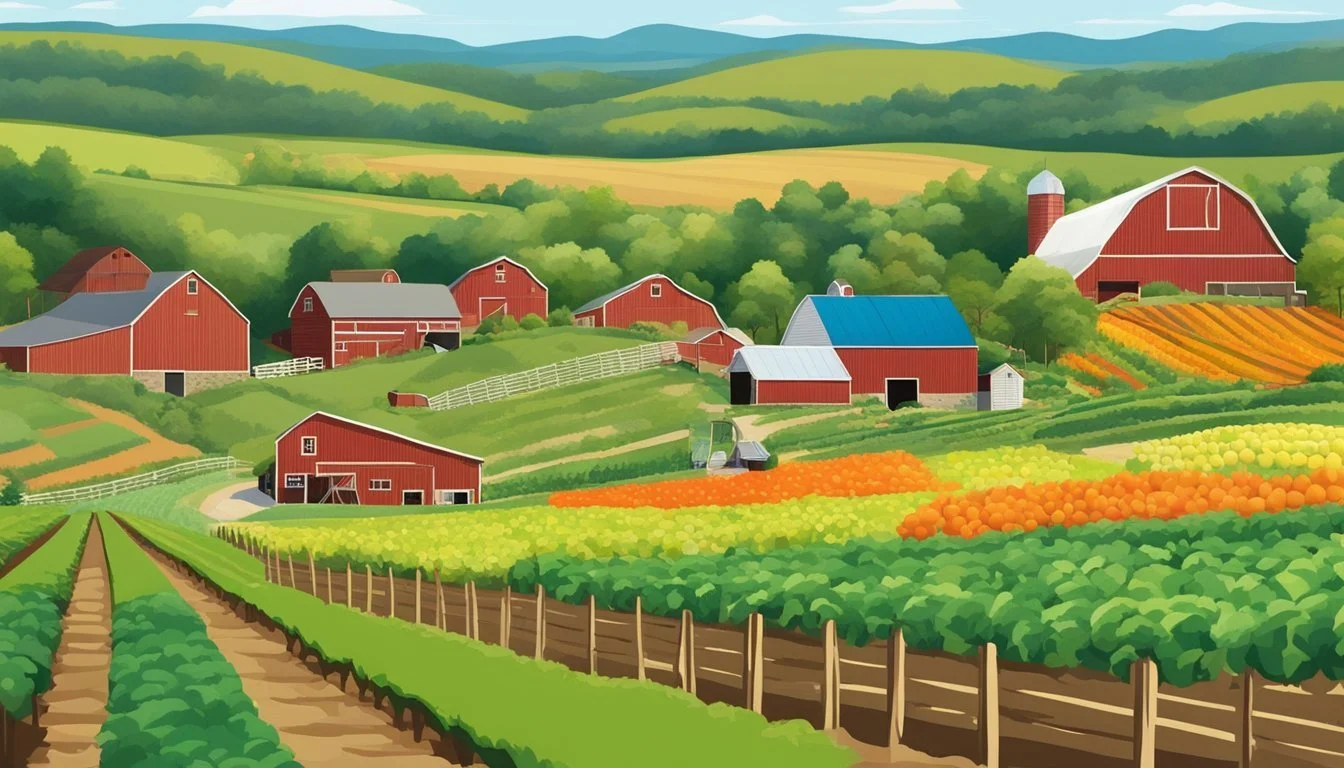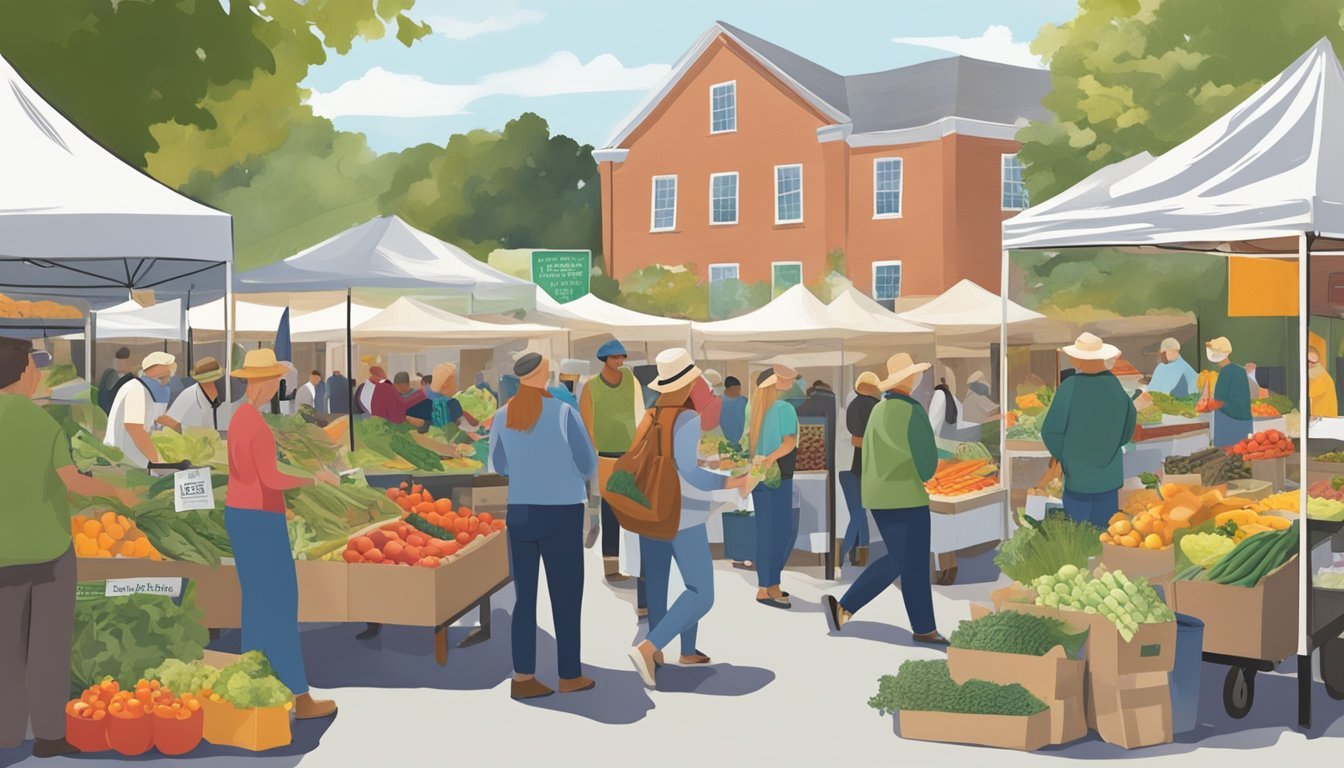Community Supported Agriculture in Massachusetts
A Guide to Local CSAs
Community Supported Agriculture, commonly known by its acronym CSA, has become an integral part of the agricultural landscape in Massachusetts. A CSA farm operates on a subscription model where consumers purchase shares of a farm's harvest in advance. These shareholders are then provided with a portion of the farm's produce throughout the growing season, fostering a direct relationship between farmers and consumers. This model supports local agriculture, ensures a market for farmers' goods, and supplies shareholders with fresh, locally-sourced food.
In Massachusetts, residents have a variety of CSA options, each offering a unique set of products and experiences. Some farms provide the traditional weekly box of vegetables, while others include a range of produce, eggs, and specialty items sourced from a collection of local farms. The advance payment by CSA members provides farmers with much-needed capital at the start of the season, mitigating some of the financial risks inherent in farming.
This system also encourages sustainable and organic farming practices by providing a stable income stream for farmers dedicated to these methods. It builds community resilience and contributes to long-term food security, while the shareholders gain understanding and appreciation for the seasonality of food production. With Massachusetts being home to a multitude of CSA programs, including those with decades of operational experience, the state presents an exemplary model of how CSAs can benefit both communities and local agriculture.
Understanding CSA
Community Supported Agriculture (CSA) is a model that connects consumers directly with local farms, providing mutual benefits. In Massachusetts, this concept has both a rich history and an active presence, supporting local farmers and communities through a system of shared rewards and responsibilities.
Defining Community Supported Agriculture
Community Supported Agriculture (CSA) allows individuals to purchase "shares" or subscriptions from local farms. These shares often take the form of weekly deliveries or pickups of various farm products, which may include:
Vegetables
Fruit
Herbs
Eggs
Specialty items
The typical model involves customers paying for the entire season up-front, although some farms offer more flexible payment plans, with options for weekly or monthly payments. A distinct characteristic of CSAs is that members may be required to contribute a small amount of time working on the farm, further strengthening the farm-to-consumer relationship.
History of CSA in Massachusetts
The roots of Community Supported Agriculture in the United States can be traced back to Massachusetts. Specifically, the CSA model was introduced to the US in 1985 by Robyn Van En at her farm in South Egremont, Massachusetts. She was inspired by similar models she learned about from Europe and established one of the first formal CSAs in the country.
Her work planted the seed for the expansion of CSAs, which today are an integral part of Massachusetts's local food system. These farms embody a shared commitment:
Stable Income: Farmers benefit from a stable income early in the season.
Fresh Produce: In return, members receive fresh, local farm products.
Through CSA, consumers in Massachusetts can actively partake in local agriculture, sustaining farms and contributing to the state's commitment to fresh, locally-sourced food.
How CSA Works
Community Supported Agriculture in Massachusetts fosters a strong relationship between local farmers and community members by providing seasonal access to fresh produce. Members invest in a farm's harvest and receive regular shares of the yield, which they can pick up at designated locations or have delivered.
The Structure of CSA Models
Traditional CSA: This model involves members paying in advance for a season's worth of produce. They receive a weekly or biweekly share determined by the farm based on what is currently in season and abundant.
Farmer's Choice: Farmers select an assortment of produce, which often includes vegetables, fruits, herbs, and sometimes additional items like eggs or honey.
Member's Choice: Some CSAs allow members more flexibility in choosing the items that will be in their share from a list of available produce.
Table - Typical Share Contents:
Type Contents Vegetables A diverse selection of seasonal vegetables Fruits Available fruits from the farm or local producers Herbs Fresh herbs for flavoring and cooking Additional Items Eggs, honey, or other farm products as available
Seasonal Timeline
The CSA model is deeply rooted in the agricultural season, which in Massachusetts generally runs from early spring to late fall.
Pre-Season (Winter to Early Spring): Members sign up and pay for their shares in advance, providing the farmer with working capital to prepare for the growing season.
Growing Season (Spring to Fall): Farmers plant, tend, and harvest crops. Members typically begin receiving shares in late spring or early summer as crops become available.
Pick-Up/Delivery: Members pick up their shares weekly or biweekly at designated locations. Some CSAs also offer delivery options for convenience.
Post-Season (Late Fall to Winter): Share distributions end with the close of the growing season, though some farms extend offerings with storage crops or greenhouse produce.
Calendar - Example of a CSA Season:
March: Member enrollment
April-May: Seed planting
June: First share distribution
July-September: Peak season distributions
October: Season winds down
November: Last distributions and season-end preparations
Benefits of CSAs
Community Supported Agriculture (CSA) programs in Massachusetts offer a model that connects consumers directly with local farms, providing mutual advantages. This sustainable food system fosters community involvement, assures the delivery of fresh, often organic produce, and upholds a partnership based on trust between growers and consumers.
Advantages for Consumers
Fresh and Local Food: Members receive a share of the farm's harvest, which means the food they consume is fresh, seasonal, and locally grown. This reduces the time between harvest and consumption, enhancing flavor and nutritional value.
Trust and Transparency: Consumers develop a close relationship with farmers, gaining insight into the production methods and origin of their food. This transparency builds trust in food quality and safety.
Advantages for Farmers
Steady Income: By receiving payments upfront, farmers gain financial stability for the season, which helps with planning and resource management.
Market Assurance: CSA members commit to the farm for the season, providing growers with a guaranteed market for their produce. This reduces the risks associated with fluctuating demand and unsold inventory.
Joining a CSA in Massachusetts
When considering joining a CSA in Massachusetts, individuals have a variety of farms to choose from, each with differing commitments and costs. They must evaluate what works best for their lifestyle and budget, keeping in mind that local agriculture plays a vital role in their communities.
Choosing a CSA Farm
To select a CSA farm that meets personal needs and values, one should consider the types of produce offered and the farm's location. Some farms like Eastie Farm focus on improving food security and offer a range of produce, while farms like The Farm at Moose Hill provide community connections through certified-organic goods. Membership details may include whether a farm is certified organic, such as Bay End Farm, and the extent of produce variety which can encompass vegetables, fruit, and herbs.
Commitment and Costs
Joining a CSA involves a financial commitment, typically requiring payment for the season upfront. However, certain farms may offer more flexible payment plans, including weekly or monthly options. Most CSAs request that members invest in a 'share' of the farm's harvest, which translates to regular deliveries or pickups of fresh produce. For instance, a farm affiliated with Mass Audubon aims to deliver a 20% return on investment to shareholders. Costs can vary based on share size and the type of produce, and individuals should also consider potential risks such as fluctuating yields due to weather conditions. Some CSA farms may also expect members to contribute a small number of hours working on the farm, strengthening the bond between consumer and producer and promoting an understanding of the agricultural process.
Organic and Sustainable Practices
In Massachusetts, Community Supported Agriculture emphasizes organic and sustainable agriculture practices. These farms exemplify commitment to environmental stewardship and healthy food production.
Organic Farming Certification
Certified Organic farms in Massachusetts must adhere to strict federal guidelines to use the designation. Certification requires maintaining soil and water quality, implementing eco-friendly pest and weed control, and excluding the use of synthetic fertilizers and genetically modified organisms (GMOs). Data from the USDA Census highlights that Massachusetts has 198 Organic farms, reinforcing the state's commitment to environmentally responsible farming practices.
Sustainable Agriculture Methods
Sustainable agriculture methods are employed by CSA farms to both safeguard the environment and provide bountiful harvests. Emphasizing the health of the soil, farms often utilize:
Compost and organic fertilizers: These natural options replenish nutrients without the harsh effects of synthetic options.
Water conservation techniques: Efficiency is key, with drip irrigation and rainwater collection reducing overall water usage.
Crop rotation and diversity: These practices prevent soil depletion and reduce the risks of pest infestations.
CSA farms in Massachusetts not only offer fresh food but also contribute positively to the local ecosystem through these sustainable practices.
CSA Offerings in Massachusetts
In Massachusetts, Community Supported Agriculture (CSA) farms offer a variety of fresh, locally-grown produce and products, often incorporating organic farming practices. Subscribers to CSAs receive regular deliveries or pick-ups, contributing to food security and sustainability within the community.
Types of Produce and Products
Massachusetts CSAs supply an extensive array of fresh produce, including but not limited to:
Vegetables: A diversity of vegetables ranging from leafy greens to root vegetables.
Fruit: Seasonal fruits such as apples and berries.
Herbs: Fresh herbs to enhance culinary flavors.
Meat: Some farms provide options for pastured meats.
Flowers: Certain CSAs may offer beautiful, locally-grown flowers.
Other Specialty Items: Eggs, dairy products, and hand-crafted goods may also be available.
CSAs in the state also support organic farming, with options for certified organic produce.
Diversity of CSA Farms
Massachusetts is home to a rich diversity of CSA farms, each with their own unique offerings:
Farm Practices: A range from certified organic farms to those utilizing natural growing practices.
Size and Scope: Farms vary in size and the breadth of products they provide.
Livestock: Some farms incorporate livestock into their operations, offering both produce and animal products.
Regional Varieties: CSA offerings often reflect the agricultural diversity of different regions within Massachusetts, with coastal farms providing distinct options compared to those inland.
These farms contribute to a robust and equitable local food system, emphasizing fresh, nutritious, and sustainably-raised products for their members.
CSA Pickup and Distribution
Community Supported Agriculture in Massachusetts offers various distribution methods to accommodate the needs and preferences of their members. The common approaches usually involve on-farm pickups or deliveries to designated community pick-up points.
Pick-up Locations and Logistics
CSA members often have the flexibility to collect their shares directly from the farm stand, providing a direct connection to the source of their produce. Pickup times are typically pre-scheduled to streamline the distribution process and ensure the freshness of the produce. Farms like Farmer Dave's support pick-up in multiple communities which allows members easier access to their CSA shares. Furthermore, some CSAs feature farm stand days where members can select fresh produce on-site.
Examples of Farm Stand Pick-up: Farmer Dave's CSA, Drumlin Farm
Logistics Details:
Pre-scheduled times: Helps manage member expectations and farm operations.
Locations: Varies from farm to farm, often within the local area of the farm or nearby towns.
Community Pick-up Points
CSAs often collaborate with local businesses and community centers to establish convenient pick-up points for members. This method reduces the travel burden for CSA members who may not live close to the farms. These sites can be found in various regions, including the Merrimack Valley, North Shore, and diverse metropolitan areas like East Boston. CSA programs recognize the importance of such points to provide accessibility to fresh produce, particularly in urban areas that may be underserved by fresh food retailers.
Community Pick-up Example: Eastie Farm in East Boston
Advantages:
Accessibility: Central locations that are convenient for multiple members.
Community Engagement: Fosters a sense of communal participation and support for local agriculture.
Members typically receive a weekly delivery or pick-up of vegetables, fruit, or herbs, ensuring that they have access to seasonal, locally-grown produce. Some CSAs, understanding the needs for flexibility, offer weekly or monthly payment options to accommodate different financial capabilities and facilitate broader community participation.
CSA Partnerships and Outreach
Community Supported Agriculture (CSA) in Massachusetts demonstrates a strong commitment to building local partnerships and fostering education within the community. These programs establish a symbiotic relationship between consumers and producers and empower local economies by prioritizing community-based labor.
Collaboration with Local Businesses
CSAs in Massachusetts often form strategic partnerships with local businesses, including farm stands, restaurants, and specialty food shops. For example, Bay End Farm, a Certified Organic farm, not only offers CSA memberships but also supplies fresh produce to various local establishments in the Cape Cod area. Such partnerships promote food sustainability by ensuring that local food is accessible to diverse market segments. They also allow local businesses to contribute labor and investment to support the farming community.
Educational Programs
Educational outreach is a critical component of Massachusetts CSAs, focusing on teaching community members about sustainable agriculture and food systems. Eastie Farm, an urban agriculture nonprofit in Massachusetts, integrates their CSA with education and climate justice initiatives, providing a model of how CSAs can play a role beyond just food distribution. The farm actively engages with schools and community members, offering programs that contribute to food security and foster resilience through direct community involvement.
CSA Farms in Massachusetts
Massachusetts offers a diverse array of CSA farms, providing residents with fresh, locally-grown produce throughout various seasons. These farms allow members to support local agriculture while enjoying a direct line to high-quality food.
Notable CSA Farms in the Region
Red Fire Farm: This farm stands out for its extensive offering of organic fruits and vegetables. Located in Western MA, it has built a reputation over the years for its sustainable practices and commitment to community enrichment.
Siena Farms: Operating over 75 acres in the towns of Sudbury and Sterling, Siena Farms offers a CSA Farm Share Membership Program that brings fresh, family-farmed produce to the Boston area.
Warner Farm: Known for their 300-year farming history, Warner Farm is located in the Pioneer Valley of Western MA, providing a variety of produce to the community.
Chestnut Farms: Serving the New England region, Chestnut Farms focuses on providing meat through a CSA model, catering to those looking for locally raised meat options.
CSA Directories and Resources
The Massachusetts government's official website, Mass.gov, furnishes detailed information about CSA farms across the state, explaining how the CSA model works and offering a resource to locate different farms.
For a comprehensive listing of CSA farms near Boston and across Massachusetts, one can consult websites such as LocalHarvest. This resource lists over 71 CSA options available in proximity to Boston, MA, and is a valuable tool for community members seeking to connect with local farms.
Supporting Local Agriculture
Community Supported Agriculture (CSA) initiatives exemplify the partnership between residents of Massachusetts and the local agricultural community. These programs reinforce trust and mutually beneficial relationships.
Community Involvement and Support
Massachusetts' citizens can directly contribute to the sustainability of local farms by participating in CSA programs. Local Agriculture benefits from this engagement as it ensures a consistent market for farm products. CSA members receive regular shares of fresh produce, which fosters a closer tie between the people and the land that feeds them.
Local Food: Individuals receive a variety of fresh, often organic, products which may include fruits, vegetables, eggs, and other farm-derived items.
Trust and Commitment: By paying for a CSA share upfront, members show a commitment to the farm's success and gain a sense of trust in knowing where their food comes from.
Impact on Local Economy
The involvement in CSAs has a profound impact on the Massachusetts economy:
Money Circulation: Funds spent on CSAs stay within the local economy, amplifying the financial stability of local farmers.
Farmers Markets: The symbiotic relationship extends to farmers markets, where the visibility and reach of local products are enhanced.
Direct economic benefits are paired with an increased valuation for sustainable farming practices.
Employment opportunities often arise, contributing to overall community resilience.
Challenges and Considerations
Community Supported Agriculture (CSA) in Massachusetts confronts various challenges that both farmers and members must consider. These challenges revolve around the inherent risks of farming and the impact of seasonality on crop success.
Understanding the Risks
Farmers face the possibility of financial instability and members must acknowledge the potential for variance in harvest yields. Engaging in a CSA means accepting the risks associated with agricultural production, such as adverse weather events, pest infestations, and diseases which can affect crops. CSA members usually pay in advance, sharing the risk with the farmer, but must understand that the quantity and variety of produce are not guaranteed.
Seasonal Variability and Crop Success
Seasonal variability is a significant factor influencing what and how much is harvested. In Massachusetts, the weather can be unpredictable, with conditions ranging from late frosts to heatwaves, which can drastically affect crop growth and yield. CSA farm operations need to plan carefully, often growing a variety of crops to mitigate the risk of total loss due to these conditions. Members should be prepared for the seasonal fluctuations that affect their weekly shares.
Future of CSA in Massachusetts
Community Supported Agriculture (CSA) in Massachusetts is poised for development with a strong focus on sustainability and community engagement. This growth is fueled by both innovative farming practices and a growing trend toward local, sustainable food sources.
Trends and Growth
The trend in Massachusetts reflects a shift towards supporting local agriculture through CSA models. Growth in this sector is characterized by an increasing number of residents investing in CSA shares. This commitment not only underscores the demand for fresh, locally-sourced products but also fortifies the economic stability of small farms. There is an observable expansion in the variety of offerings by CSA farms, including vegetables, fruit, herbs, and even specialty items like eggs, catering to a broader consumer base.
Diversification: Many CSA farms are diversifying their product range.
Membership Options: Payment flexibility with weekly or monthly plans is becoming more common.
Community Engagement: Farms are encouraging members to participate in farming activities, fostering deeper connections.
Innovation in Farming Practices
Massachusetts CSA farms are integrating innovative practices to enhance sustainability and efficiency. Advancements in organic farming and the use of technology for farm management are evidences of the ongoing innovation within the sector. CSA farms are employing methods such as crop rotation, composting, and natural pest control, minimizing environmental impact and improving the quality of their produce.
Sustainable Techniques: Emphasis on organic and sustainable farming practices.
Technological Integration: Adoption of technology in farm management, e.g., irrigation systems controlled by mobile devices.
Quality of Produce: Enhanced techniques are leading to higher quality yields.
CSA in Massachusetts is undergoing a transformative period where the emphasis on community-driven support for agriculture and the adoption of ecologically sound methods are shaping its future.
Conclusion
Community Supported Agriculture (CSA) represents a partnership model with promising implications for the health and economy of Massachusetts. The support of CSAs encourages dietary improvements by providing residents with access to fresh, locally-grown produce. It also offers stable revenue streams for small and mid-size farmers, ensuring agricultural sustainability and strengthening food resilience.
A glance at Massachusett's CSA landscape shows a trend of growth and adoption, evident from research conducted from May 2017 - December 2018, involving clinical trials. Farmers benefit from up-front payments for seasonal produce, while consumers gain from weekly deliveries of fresh vegetables, fruits, or herbs.
Moreover, the flexibility in payment methods aligns with varying financial capabilities, and some CSAs go even further by engaging members hands-on at farms. This engagement accentuates community involvement and shared commitment.
It stands that CSA interventions could be a cost-effective approach to public health for the state when subsidized appropriately. Future research agendas seem aligned towards unraveling further societal and environmental impacts of CSAs.
Sustainable practices embedded in the CSA model continue to contribute to community well-being, economic stability, and environmental health, confirming it as a viable initiative for Massachusetts' future economy. The robust evidence base generated by local input and scholarly research dignifies the CSA model's potential beyond a mere agricultural venture.
Note: Data points cited from May 2017 - December 2018 should be verified for current applicability.












